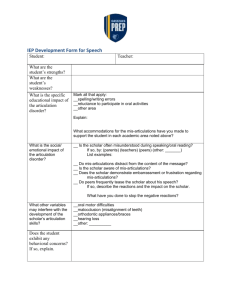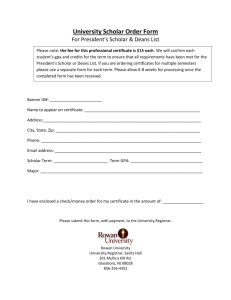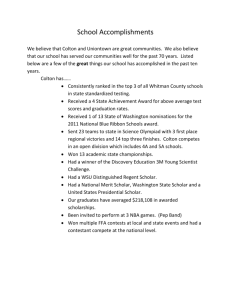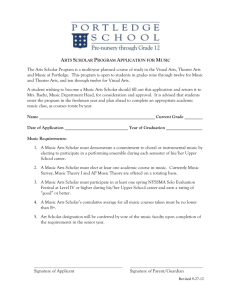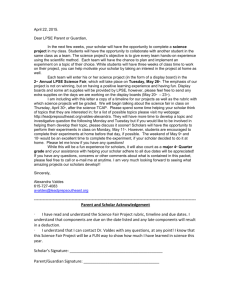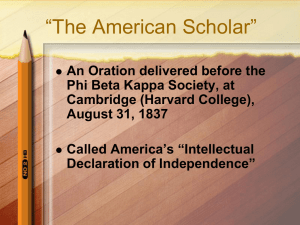Community Feedback
advertisement
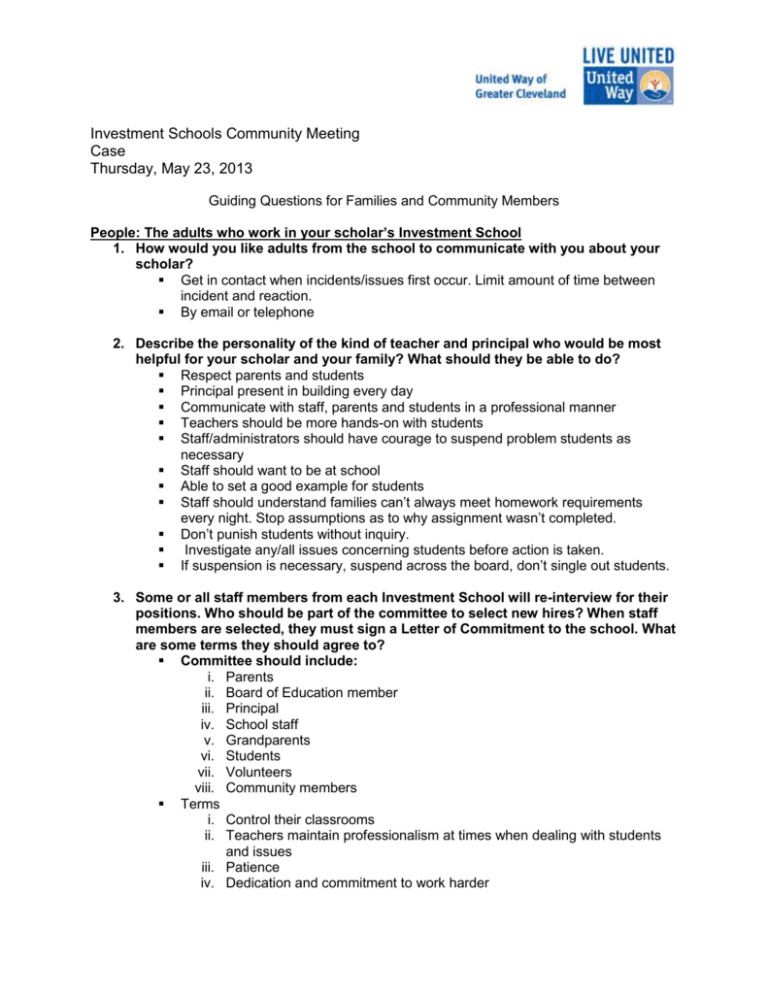
Investment Schools Community Meeting Case Thursday, May 23, 2013 Guiding Questions for Families and Community Members People: The adults who work in your scholar’s Investment School 1. How would you like adults from the school to communicate with you about your scholar? Get in contact when incidents/issues first occur. Limit amount of time between incident and reaction. By email or telephone 2. Describe the personality of the kind of teacher and principal who would be most helpful for your scholar and your family? What should they be able to do? Respect parents and students Principal present in building every day Communicate with staff, parents and students in a professional manner Teachers should be more hands-on with students Staff/administrators should have courage to suspend problem students as necessary Staff should want to be at school Able to set a good example for students Staff should understand families can’t always meet homework requirements every night. Stop assumptions as to why assignment wasn’t completed. Don’t punish students without inquiry. Investigate any/all issues concerning students before action is taken. If suspension is necessary, suspend across the board, don’t single out students. 3. Some or all staff members from each Investment School will re-interview for their positions. Who should be part of the committee to select new hires? When staff members are selected, they must sign a Letter of Commitment to the school. What are some terms they should agree to? Committee should include: i. Parents ii. Board of Education member iii. Principal iv. School staff v. Grandparents vi. Students vii. Volunteers viii. Community members Terms i. Control their classrooms ii. Teachers maintain professionalism at times when dealing with students and issues iii. Patience iv. Dedication and commitment to work harder v. Ask for help vi. Be flexible with teaching style – students don’t all learn the same way Time: Making the most of every minute in an Investment School 4. Some investment schools will lengthen the school day for everyone, and in others there will be opportunities for scholars to take part in extended learning time. What should this extra time be used for? (work time on computers, extra instruction in reading or math, small group or individual tutoring, book club, etc.) Social media Extracurricular activities Team building activities Book club Activities should be available to everyone Teachers should suggest activities to student based on needs/skill set 5. If your scholar could spend more time at school, when would work best for your family? Staying later in the afternoon? Starting earlier in the morning? Coming to school once a month on Saturday? Keeping school hours the same but taking shorter school vacations? Later in afternoon Shorter vacation – because parents need to figure out what to do with kids on vacation Money: Making the most of every dollar at an Investment School 6. How can the visible appearance of the school building be improved? What would make it feel more clean, more safe, more welcoming? Wheelchair ramp between first and second floors More security Painting More janitors Assistant Secretary Lockers Guidance counselors More parent involvement Full-time nurse Assistant principal Playground 7. Have you noticed anything about the school that makes you feel money is being used in smart ways, or that money is being wasted? 8. What kinds of investment would demonstrate to you that the school has changed in positive ways? Playground Bring back voucher programs Student uniforms Textbooks Entrance from and exits into parking lots Incorporate 21st century teaching iPads Programs: Supporting the success of every scholar in the Investment Schools 9. We want to provide you with regular report cards about how the school is improving. What information do you think is most important and interesting to include? Improved attendance Improved test scores 10. What organizations in the community do you trust to offer services to your scholar and your family and how do you think the school should work in cooperation with those organizations? Greater Cleveland Congregations Banks Rainy Institute Other arts organizations City Mission Sunrise Tutoring Recreation centers 11. What non-academic programs or extra-curricular activities would appeal to scholars (i.e. sports, arts, chess, and gardening, anything else?) Girl Scouts Cheerleading Sports – football, basketball, baseball, soccer and volleyball 12. What kinds of activities help your scholar to learn best? What gets him or her excited about learning? Computers Guiding Questions for Scholars 1. If you were the principal and could change one thing about the school what would you change? Update and clean the building Dress code Better school lunches Build a playground Change the way we learn More computers More athletics Better bathrooms Teach using tablets (i.e. use time to play Angry Birds as a reward) Use YouTube videos to teach 2. Describe a helpful teacher, How should your teacher work with your to help you learn best? Helping and supportive Food Make learning fun More classrooms Incorporating Smart Boards in lessons 3. What can your principal do to make your school a better place to learn? Take out some of the teachers No dress code No suspension – use warnings, time outs When you do really well, you get a dress down day on Fridays Go to tutoring instead of class Extra gym time Stop kids from cursing Have parties Get lockers Get a different gym teacher 4. If you were at school more time than you are now, which would you choose – staying later in the afternoon, starting earlier in the morning, coming to school once a month on Saturday, keeping school hours the same but taking shorter school vacations? More learning Be active all day More computer time More science, more math Gaming Club Bring in video games 5. If you were at school for more time than you are now, which would you choose – staying later in the afternoon, starting earlier in the morning, coming to school once a month on Saturday, keeping school hours the same but taking shorter school vacations. Earlier each day – 4 votes Stay later – 9 votes One Saturday per month – 10 votes Shorter vacation time – 0 votes Stay at school instead of going to day care – yes Time spent at the end of day at rec center – yes 6. What extracurricular activities would you be interested in? Sports, arts, gardening, chess are some examples to get you thinking. Sports (Volleyball, Football, Basketball, Track, Skating) Cheerleading Dance Classes Music Art Guiding Questions for Community Partners 1. If you have provided services/activities at the school in the past (or currently), describe how you know your work is having positive impact on the students (and their families, if applicable). The number of people attending increased and their participation in programs, etc. has increased. They received positive feedback from students and parents. Community Spaces are very important to foster relationship building. People from the community are volunteering their time and getting involved. We help facilitate parent involvement in/with school by explaining rules, helping parents frame their questions and concerns. 2. If you are not currently working in the school, in what ways do you think your organization could best offer support to the school and its students? Support parent programs Support parent interaction with school Mentor parents Connecting various support groups around the school. Instability of the neighborhood/community (this school has a large transient population) creates a barrier to connecting with community. Listen, connect Build awareness around the “story” of this community/neighborhood/students. Each neighborhood has its own flavor, embrace that flavor. Support teachers and administrators develop and accomplish their mission. Hear parents concerns – listen and support their POV and requests Build a relationship with parents – work together. 3. What other needs have you observed not being met in the school, for students and/or families? Clean up schools, clean up the physical environment. The school is not welcoming and doesn’t inspire learning. The classrooms look chaotic. The school was originally built for elementary school students, which means many of the facilities are small or low to the ground. This school does not have a warm and inviting appearance, very depressing atmosphere. Organize classrooms Address the current building design; look for ways to modify facilities to ‘fit” all students. 4. Does your program or service have a direct tie-in to students’ academic learning or social-emotional learning? Yes Develop wrap-around learning. Provide one on one learning through tutoring/volunteers. 5. What are effective ways to communicate with school leadership and teachers about the program work being accomplished in the school? What gets in the way of effective communication? Be present daily Utilize volunteers Lack of transparency. Be transparent. Respect everyone. Be accountable to self, mission, student’s community. Build relationship(s).


